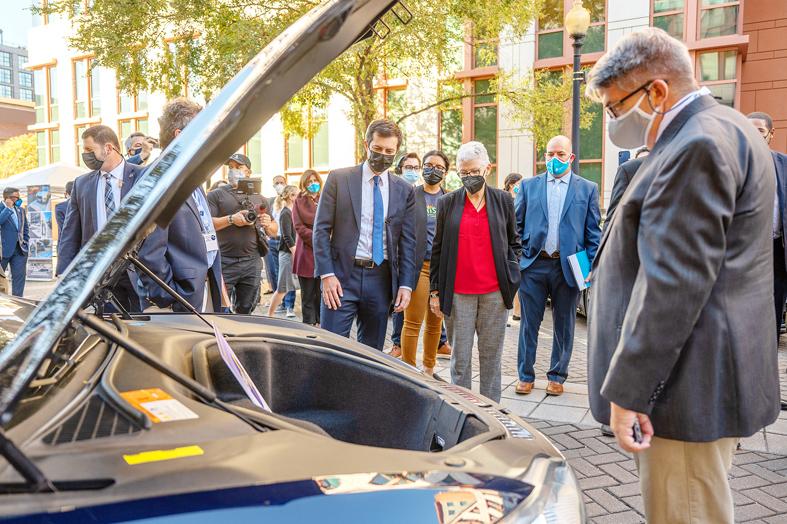Tesla Inc’s third-quarter profits more than quadrupled on sharply higher sales, despite a global semiconductor shortage that has plagued the auto industry, according to results released on Wednesday.
The electric vehicle (EV) maker headed by CEO Elon Musk posted a record profit of US$1.6 billion for the three-month period, as revenue surged 57 percent year-on-year to US$13.8 billion.
Tesla also delivered a record 241,391 vehicles during the period, with sales significantly ramping up in North America and China.

Photo: Bloomberg
The results suggest that Tesla’s output has been less affected by the global shortage of semiconductors than some rival automakers that have shuttered factories or cut production.
However, the company said that chip shortages, as well as congestion at ports and rolling blackouts, “have been impacting our ability to keep factories running at full speed.”
“We believe our supply chain, engineering and production teams have been dealing with these global challenges with ingenuity, agility and flexibility that is unparalleled in the automotive industry,” Tesla said in the accompanying news release.
Tesla notched slightly lower revenue on the sale of EV regulatory credits to other automakers compared with the same period last year.
The company also reported a US$51 million impairment related to its bitcoin investment.
However, profit margins expanded, even as the company alluded to uncertainties amid the lingering supply chain challenges.
“We continue to run our production lines as close to full capacity as conditions allow,” Tesla said. “While sequential growth remains our goal, the magnitude of growth will be determined largely by outside factors.”
The EV maker said its “gigafactory” near Berlin — its first European plant, which is expected to ultimately produce about 500,000 vehicles per year — is expected to receive final permit approval by the end of the year, while another gigafactory in Austin, Texas, is “progressing as planned,” it said.
Tesla is nearing assembly of its first production line vehicles in Austin and Berlin, but the “hardest work lies ahead” in ramping up output, Tesla chief financial officer Zack Kirkhorn said on an earnings call.
Tesla has completed a shift to its factory in Shanghai, China, being its main hub for export vehicles, freeing up other plants to provide more vehicles for Europe and North America, Tesla executives said.
The company’s stated goal is to get on pace to produce millions of vehicles annually.
“There appears to be quite a profound awakening of desirability for electric vehicles,” Kirkhorn said. “It’s called us a little bit off guard. Folks want to buy an electric car and folks want to buy a Tesla right now. It’s very exciting for us.”
CFRA Research analyst Garrett Nelson said that the strong results were already priced into Tesla shares, describing the trading action as “muted.”
Moreover, the company’s statement that the magnitude of its growth “’will be determined largely by outside factors gives investors pause,” Nelson said.
Tesla shares dipped 1.3 percent to US$854.40 in after-hours trading on Wednesday.
Shares have risen more than 25 percent in the past two months.

Taiwan Semiconductor Manufacturing Co (TSMC, 台積電) last week recorded an increase in the number of shareholders to the highest in almost eight months, despite its share price falling 3.38 percent from the previous week, Taiwan Stock Exchange data released on Saturday showed. As of Friday, TSMC had 1.88 million shareholders, the most since the week of April 25 and an increase of 31,870 from the previous week, the data showed. The number of shareholders jumped despite a drop of NT$50 (US$1.59), or 3.38 percent, in TSMC’s share price from a week earlier to NT$1,430, as investors took profits from their earlier gains

In a high-security Shenzhen laboratory, Chinese scientists have built what Washington has spent years trying to prevent: a prototype of a machine capable of producing the cutting-edge semiconductor chips that power artificial intelligence (AI), smartphones and weapons central to Western military dominance, Reuters has learned. Completed early this year and undergoing testing, the prototype fills nearly an entire factory floor. It was built by a team of former engineers from Dutch semiconductor giant ASML who reverse-engineered the company’s extreme ultraviolet lithography (EUV) machines, according to two people with knowledge of the project. EUV machines sit at the heart of a technological Cold

Taiwan’s long-term economic competitiveness will hinge not only on national champions like Taiwan Semiconductor Manufacturing Co. (TSMC, 台積電) but also on the widespread adoption of artificial intelligence (AI) and other emerging technologies, a US-based scholar has said. At a lecture in Taipei on Tuesday, Jeffrey Ding, assistant professor of political science at the George Washington University and author of "Technology and the Rise of Great Powers," argued that historical experience shows that general-purpose technologies (GPTs) — such as electricity, computers and now AI — shape long-term economic advantages through their diffusion across the broader economy. "What really matters is not who pioneers

TAIWAN VALUE CHAIN: Foxtron is to fully own Luxgen following the transaction and it plans to launch a new electric model, the Foxtron Bria, in Taiwan next year Yulon Motor Co (裕隆汽車) yesterday said that its board of directors approved the disposal of its electric vehicle (EV) unit, Luxgen Motor Co (納智捷汽車), to Foxtron Vehicle Technologies Co (鴻華先進) for NT$787.6 million (US$24.98 million). Foxtron, a half-half joint venture between Yulon affiliate Hua-Chuang Automobile Information Technical Center Co (華創車電) and Hon Hai Precision Industry Co (鴻海精密), expects to wrap up the deal in the first quarter of next year. Foxtron would fully own Luxgen following the transaction, including five car distributing companies, outlets and all employees. The deal is subject to the approval of the Fair Trade Commission, Foxtron said. “Foxtron will be